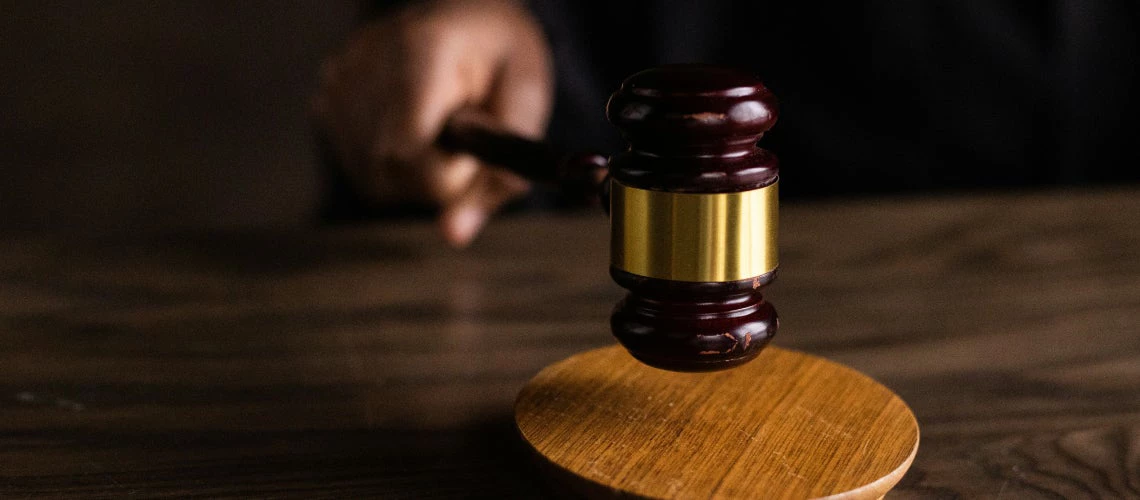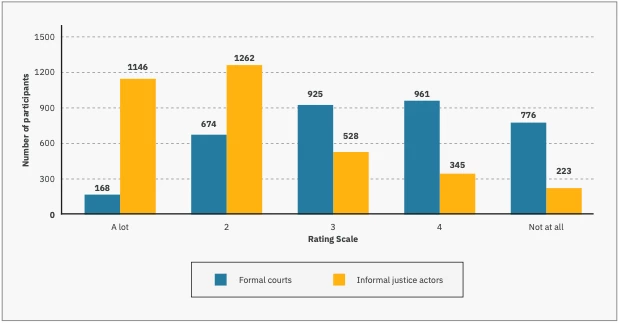 Judge in court. Photo: Ekaterina Bolovtsova
Judge in court. Photo: Ekaterina Bolovtsova
What makes a judicial system effective? Can this effectiveness be measured? How can we improve judicial service delivery for people? A new World Bank tool called JUPITER (Justice Pillars Towards Evidence-Based Reform) assesses the effectiveness of a country’s judiciary in three areas: access to justice, efficiency, and quality. By measuring the strengths and weaknesses of a country’s judicial system, it informs policy recommendations to improve justice through evidence-based reform.
With support from the State and Peacebuilding Fund, the methodology was first applied in Liberia, a country that has been making efforts to improve the overall performance of its judiciary. Using a combination of survey information, court data, and insights from previous studies, the assessment findings highlight that trust plays a key role in people’s interaction with the justice system. To help improve access to justice and increase trust in judicial institutions, we share three lessons that can be applicable in Liberia and countries with similar contexts:
-
Liberians highly trust customary justice actors, and reforms should be responsive to this reality. Like many countries in Africa, Liberia has a dual legal system, where state and non-state justice coexist. Sixty-nine percent of Liberians trust local customary authorities to resolve their disputes (Figure 1). The Government can leverage the role of customary justice by creating more transparent and specific rules of engagement between the two systems while strengthening the formal system to become a better alternative for people. Building these mutually beneficial linkages is essential to increasing trust in formal justice institutions. This can be done by taking advantage of the customary system’s cost-effectiveness, speed, and cultural proximity to the people while standardizing specific processes and providing better protection against discrimination and harmful practices.
Figure 1. Liberians trust the customary system more than the courts.
Source: LISGIS, PBO, UNDP, and OHCHR. 2019. Public Perceptions of Liberian Justice and Security Institutions.
Note: Participants were asked to what extent they trusted the courts and informal justice actors from 1 (“I trust these actors a lot”) to 5 (“I do not trust these actors at all”).
-
Leveraging existing strengths and addressing high costs can increase the formal system’s efficiency and affordability, further improving trust. Courts in Liberia tend to be perceived as inefficient and costly, which can factor in people’s reliance on the customary system. Two strategies can help address these issues. First, the Government can harness strengths within the existing judicial system by maximizing the role of specialized courts, which have proved to be significantly quicker in disposing of cases. A simple amendment to the magistrate courts’ jurisdictional rules would allow more appeals to fall under the specialized courts’ purview. Second, the report identifies strategies to make court fees more transparent and attuned to users’ needs. This can help make costs more predictable and allow the government to diagnose excessive fees. Increasing the formal system’s efficiency and affordability can help improve people’s confidence in the courts.
-
Access to legal information increases transparency and accountability, fostering trust in the judicial system. Providing free access to regularly updated legal information can level the playing field by increasing people’s awareness of their rights and how to exercise them before the courts. Legal literacy campaigns can be modeled on how Liberians consume information, through radio, social media, and community gatherings. Access to legal information can enhance the transparency of the legal framework and improve trust in formal institutions, enabling citizens to hold the government and judicial officials accountable. Leveraging existing initiatives like the Liberian Legal Information Institute (LiberLII) can be an effective and relatively inexpensive way to improve access to justice in the country.
Moving forward, the strong preference for customary forums has significant implications for the justice agenda in Liberia and other African countries. Improving the access, efficiency, and perceived fairness of the courts is one major step toward shifting people’s preferences for the formal justice system, but it is not the only factor. A significant shift can only be achieved if trust in the courts exceeds trust in the customary system. Future justice interventions should focus on improving trust in the judiciary and public institutions more broadly. JUPITER can be a useful tool to propose strategies to improve justice tailored to a country’s context, which will soon be deployed in other countries in the region.
Editor’s note: This blog post is part of a series on Justice and Development in the Global Program on Justice and the Rule of Law, which is supported by the State and Peacebuilding Fund and the Governance and Institutions Umbrella Program.
About the State and Peacebuilding Fund (SPF):
The SPF, a global multi-donor fund administered by the World Bank, supports programs that address the drivers and impacts of fragility, conflict, and violence (FCV) and strengthen the resilience of countries and affected populations, communities, and institutions. The SPF is supported by: Denmark, Germany, Netherlands, Norway, Sweden, and Switzerland.
Follow this link to learn more about the SPF.
About the Governance and Institutions Umbrella Program (G&I):
The Governance and Institutions Umbrella Program is a multi-donor trust fund established in 2022 with support from the Chandler Foundation, the William and Flora Hewlett Foundation, and the MacArthur Foundation. G&I is also funded by the UK Government’s Foreign, Commonwealth & Development Office (FCDO), the European Union, and Republic of Estonia. The Program supports World Bank client countries to build capable, efficient, open, inclusive, and accountable institutions and improve public sector performance and institutional reform, increase application of digital and technology solutions in the public sector, and enhance transparency and accountability. To learn more, please visit www.worldbank.org/giup.




Join the Conversation